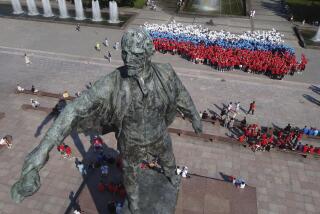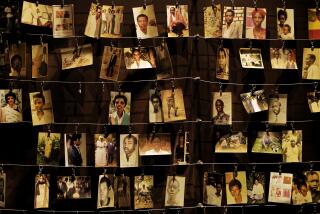Willing to Wound, and Yet Afraid to Strike
- Share via
American policy toward Nicaragua raises a question that is recurrent in diplomacy: Does it make sense to assume a moral posture about conditions in a foreign country when there is no certainty that physical power will be brought to bear on those conditions?
In the clash of ideology, democracies can call on an endless supply of indignation, but, in circumstances in which force is either untenable or inappropriate, mere indignation as a substitute can be not only worthless but also counterproductive.
Domestic resentment about Jimmy Carter’s human-rights initiatives probably hardened some regimes (Argentina and the Philippines, for instance) in their odious practices, and it remains to be seen whether scattered economic pressure will cause the South Africans to dig in or see the error of their ways.
In Nicaragua, however, indeed throughout Central America, the dilemma for the United States is more vividly drawn. It is one thing to gaze unfavorably on totalitarianism in a distant continent, but it is quite another to contemplate the potential exporting of revolution in our backyard.
The Reagan Administration has concluded that the Sandinista junta has turned Nicaragua into a Marxist client state of the Soviet Union--the evangelical equivalent, in this decade, of Fidel Castro’s Cuba in the 1960s.
Not so long ago Managua served as the supply depot of the anti-government insurgency in El Salvador. And the visit of Nicaraguan President Daniel Ortega to Moscow, hard on the heels of congressional rejection of aid to his adversaries in the field, reminded even House Democrats that there is more to the Sandinista revolution than poetry and rural health clinics.
Yet the stunning feature of the Reagan Administration’s aid package for the contras was not its bulk but its modesty. By federal standards $14 million of humanitarian aid is not much, and by the standards of high-stakes hemispheric diplomacy it is next to nothing. It might even be argued that such a puny sum was not only worthless but also dangerous, and that congressional disapproval emphasizes the futile nature of such gestures.
Which brings us around to the original proposition: whether our national interest is served by rhetoric or action in Nicaragua. Clearly the congressional vote on aid to the contras was a greater debacle than the measure’s proponents lamented or its opponents celebrated--and not just as it pertained to the President’s authority on Capitol Hill. The United States is “willing to wound, and yet afraid to strike.”
Given such a clear signal of American intentions and resolve, Ortega’s mission to Moscow was inevitable. Our policies may now be perceived in Managua as an irritant rather than a threat, and whatever caution the Sandinistas may have exercised in flexing their geopolitical muscles will be cast aside with Soviet approval.
For a democratic state, burdened by global responsibilities, that is the worst of all possible worlds. And, as usual, the moral high ground is a mixed blessing.
In any confrontation of ideals between the Nicaraguan dictatorship and American democracy the United States enjoys the advantage of lofty principle. Few Americans see much virtue in the Sandinistas’ pervasive militarism or in their gradual repression of personal and political freedoms. Yet few Americans recognize a clear and present danger in what policymakers in Washington have concluded is a palpable threat. And, just a decade after the end of the Vietnam War, the United States is not likely to fight an insurgency that has failed to arouse or concern the public.
So the task for the Reagan Administration, while formidable, is clear. If, as the President insists, the Nicaraguan revolution represents a genuine threat to our national security, American policy must pursue a fearsome logic: Rhetoric, influence, posturing and rebuke may serve to bolster our case, but military action cannot be ruled out for the sake of political expediency. And to the degree that the Administration fails to make that case to the public, it will falter in the face of the challenge--political, military or otherwise--posed by the Sandinistas.
This is not to suggest that there are no other diplomatic means at our disposal, or that halfway measures (such as the economic embargo) will not have their desired effect in Managua. It is to say, however, that the Reagan Administration must decide to what degree it is prepared to expend its political capital in circumstances that are, at best, perilous and equivocal. Our credibility is at issue.
If the Nicaraguan regime is truly intolerable, and if the stakes in El Salvador are as high as we (and the Sandinistas) seem to suppose, we must either face the challenge or live with the consequences. Our European allies have reminded us that the burden of proof lies in Washington, not in Managua, and that the cost of failure could be exorbitant.
But which is worse: to fail in our aim, or to fail to act?
More to Read
Sign up for Essential California
The most important California stories and recommendations in your inbox every morning.
You may occasionally receive promotional content from the Los Angeles Times.













